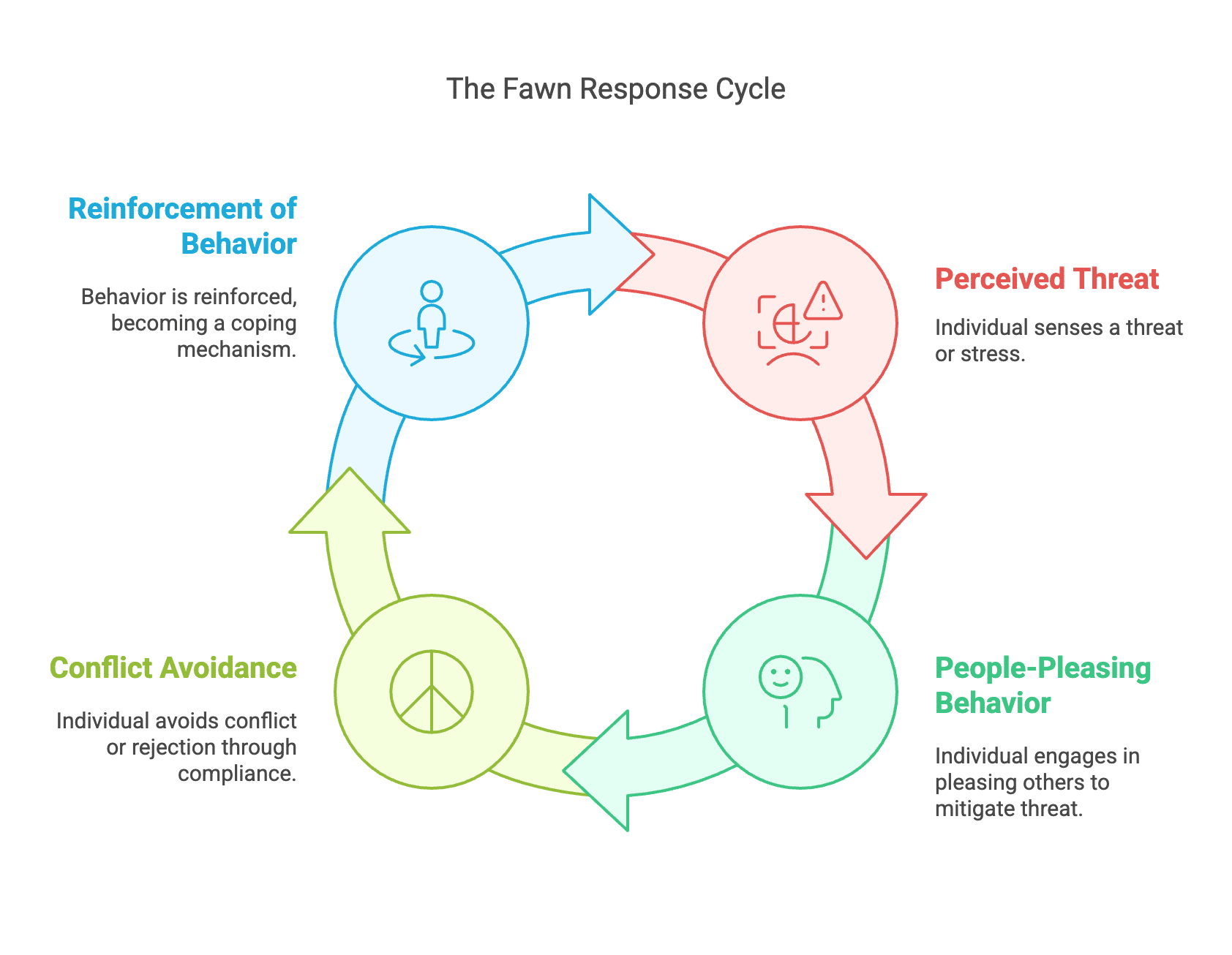Have you ever found yourself saying “yes” to everything, even when you wanted to say “no”?
This behavior might be linked to something psychologists call the fawn response – a pattern where people try to please others to feel safe.
Many adults wonder why they can’t set boundaries or feel the need to always make everyone happy.
The key is that understanding this response can help you recognize these patterns in your own life.
In this blog, you’ll look at what the fawn response means, why it happens, and, most importantly, how you can start making choices that feel right for you instead of always putting others first.
Understanding Fawn Response

The fawn response is a way some people react to stress or fear by trying to please others.
Think of it like a shield – just as some people run away from danger (flight) or stand up to fight, others try to stay safe by being extremely nice and agreeable.
Pete Walker, a licensed psychotherapist and researcher, first noticed this pattern in his work with trauma survivors.
He added the fawn response to the well-known fight-flight-freeze reactions, seeing how some people automatically switch into a people-pleasing mode when they feel threatened.
This response often starts during childhood. And, a child might learn that the safest way to handle a harsh parent or difficult situation is to be extra helpful and agreeable.
They figure out that saying “yes” and putting others’ needs first helps them avoid conflict or rejection.
Different Types of Fawner
| Type | Description |
|---|---|
| The Constant Caregiver | They put others’ needs first, always volunteering to help, even when tired, and neglect their own needs. |
| The Silent Supporter | Avoids conflict by blending in, agreeing with others even when they disagree, and rarely sharing their true opinions. |
| The Perfectionist Pleaser | Seeks acceptance through perfection and achievement, taking on more tasks and working extra hours to meet high standards. |
| The Social Chameleon | Adapts their personality and interests to fit in with different groups, mirroring others to gain approval. |
| The Professional Peacemaker | Steps in to resolve conflicts and carry others’ emotional burdens, feeling responsible for maintaining harmony. |
Major Causes of The Fawn Response in Adulthood

The fawn response in adulthood is often rooted in early childhood trauma and experiences where individuals feel unsafe or unsupported.
It develops as a coping mechanism to maintain safety and approval and avoid conflict in challenging environments.
1. Early Relationship Patterns
Growing up with parents who were unpredictable in their moods or reactions can shape how we handle relationships as adults.
However, children who have to be extra careful about what they say or do often carry this pattern into adulthood.
For example, if a child learned that speaking up led to anger or punishment, they might have found that being agreeable was the safest option.
This early learning becomes so natural that many adults don’t even notice they’re still following these childhood rules.
2. Past Emotional Stress
When someone grows up in an environment where their feelings aren’t acknowledged or validated, they often develop a habit of focusing on others’ emotions instead.
They become experts at reading other people’s moods and needs while disconnecting from their own.
As adults, they might struggle to identify what they want or need because they spent years learning to tune out their own feelings.
3. Social Conditioning
Some cultures and family systems reward compliance and penalize those who speak up or stand out.
Kids praised for being “good” (quiet and obedient) often grow into adults struggling with assertiveness.
These deeply rooted messages about the importance of keeping others happy can make it hard to break free from people-pleasing patterns.
4. Low Self-Worth
Adults who fawn often carry a belief that their value comes from what they do for others rather than who they are.
This mindset usually starts early but gets stronger over time. Each time they put someone else’s needs first, it reinforces the idea that their own needs matter less.
Breaking this cycle becomes harder as the pattern repeats.
5. Fear of Abandonment
Many people who show fawning behaviors have experienced loss or rejection in meaningful relationships.
This creates a strong drive to prevent future abandonment by being as agreeable as possible.
The fear becomes so strong that they’d rather ignore their own boundaries than risk someone leaving or becoming upset with them.
Common Signs and Symptoms of The Fawn Response

The signs of fawning behavior can show up in your daily life in ways you might not expect.
Here’s what to look out for:
In Your Communication
These patterns reveal how communication habits often reflect deeper boundary struggles.
Recognizing when you over-apologize, change your voice under stress, force laughter, avoid disagreement, or mask true feelings with dismissive phrases can be the first step toward more authentic self-expression.
- Saying “sorry” repeatedly for minor things, like bumping into furniture
- Speaking in a softer voice when you feel stressed
- Laughing at jokes you don’t find funny just to be polite
- Finding it hard to express disagreement, even about small things like where to eat
- Using phrases like “it’s fine” or “don’t worry about it” when you’re actually upset
In Your Relationships
Excessive caretaking and self-sacrifice often stem from boundary challenges.
If you constantly prioritize others over yourself—absorbing emotions, agreeing to unwanted plans, hiding preferences, and fearing saying no—you may be draining your emotional resources and authenticity.
- Taking on other people’s problems as if they were your own
- Feeling responsible when someone else is in a bad mood
- Going along with plans you don’t enjoy to avoid disappointing others
- Keeping quiet about your preferences to prevent conflict
- Feeling anxious when you can’t help someone with their request
In Your Body
Your body signals boundary issues through tension, stomach discomfort, a racing heart, and exhaustion after social interactions.
These signs indicate your nervous system is on high alert, prioritizing external demands over your own needs.
- Tension in your shoulders when someone asks for a favor
- Stomach knots when you need to say no
- Racing heart when someone seems unhappy with you
- Feeling tired after social interactions where you’ve had to be “on.”
- Physical exhaustion from always being alert to others’ needs
In Your Thoughts
Boundary issues can dominate your mind through constant worry about others’ needs, fears of abandonment, and seeking approval.
This cognitive hypervigilance prioritizes external validation over your own well-being.
- Constantly thinking about what others might need from you
- Worrying that people will leave if you don’t meet their expectations
- Second-guessing your decisions based on how others might react
- Believing that your feelings matter less than others
- Spending lots of time planning how to keep everyone happy
In Your Daily Life
Boundary challenges affect daily life through overwork without compensation, lack of rest, indecisiveness, postponed self-care, and guilt over self-focus.
These patterns create a cycle of self-neglect.
- Taking on extra work without getting paid for it
- Struggling to take breaks when you need them
- Finding it hard to make simple decisions without checking with others
- Putting off self-care because others’ needs seem more important
- Feeling guilty when you do something just for yourself
The Impact of The Fawn Response on Adult Life

The fawn response can have significant effects on adult life, shaping behavior in relationships, work, and self-worth.
While it may provide temporary relief, it often leads to burnout, poor boundaries, and suppressed emotions in the long term.
- Physical and Mental Well-being: Your body carries the weight of constant people-pleasing, which can lead to headaches, muscle tension, and exhaustion. The stress of always being alert to others’ needs can affect your sleep and cause long-term health issues.
- Career Progress: Taking on too much work without credit and struggling to speak up in meetings can slow down your professional growth. You might miss opportunities because you’re too busy helping others achieve their goals instead of focusing on your own.
- Financial Health: The habit of saying yes to every request can drain your wallet as you spend money to help others or avoid saying no to social events. You might also accept lower pay or avoid asking for raises because you don’t want to seem demanding.
- Personal Relationships: Always agreeing with others makes it hard to build genuine connections based on honest feelings and needs. Friends and partners might never know the real you because you’re too focused on being who they want you to be.
- Self-Identity: When you spend years molding yourself to others’ expectations, you might lose touch with your own likes, dislikes, and desires. Many people who fail realize they don’t know what makes them happy anymore.
- Time Management: Your schedule becomes packed with commitments to others, leaving little room for activities that bring you joy or rest. You might feel like you’re always running on empty, trying to keep up with promises you wish you hadn’t made.
- Decision-Making Skills: The habit of checking with others before making choices can weaken your ability to trust your own judgment. Simple decisions become complicated because you’re worried about how others might react.
- Future Goals: Your own dreams and plans often take a back seat while you help others achieve theirs. This pattern can leave you feeling stuck, watching others move forward while you stay in the same place.
How to Overcome the Fawn Response

Breaking free from fawning patterns takes time and patience. Here’s a practical way to help you start making changes.
1. Start with Small Steps
Begin with tiny changes in safe situations, like telling a friend which movie you’d actually like to watch.
Practice saying things like “I need to think about it” instead of automatically saying yes. These small wins build confidence for bigger challenges.
2. Learn to Notice Your Body’s Signals
Pay attention when your shoulders tense up or your stomach feels tight – these physical signs often come before people-pleasing behaviors.
When you notice these feelings, take a deep breath and remind yourself it’s okay to pause before responding to requests.
3. Practice Setting Simple Boundaries
Practice setting simple boundaries by starting with clear phrases like “I can’t today” or “This doesn’t work for me.” Keep your response short and direct—you don’t need to explain yourself or your decision.
When ending the conversation, try using “thanks for understanding” instead of apologizing with “I’m sorry,” which shifts the interaction from guilt to gratitude.
4. Develop Your Self-Trust
Regularly write down your thoughts and feelings about situations, creating an honest dialogue with yourself. Before seeking external validation, pause and ask yourself, “What do I want?” to strengthen your inner compass.
Take time to notice and acknowledge when your decisions lead to positive outcomes, reinforcing that you can trust yourself to make good choices.
5. Build Support Systems
Surround yourself with friends who genuinely respect your boundaries when you say no. Share your personal growth with people who actively encourage and validate your efforts to establish healthy boundaries.
Consider working with a counselor or therapist who specializes in trauma responses if past experiences make boundary-setting particularly challenging for you.
6. Create Daily Self-Check-ins
Take five minutes each day to connect with yourself through a series of simple yet powerful questions. Ask yourself, “How am I feeling right now?” to acknowledge your current emotional state without judgment.
Complete your check-in by determining “What’s one thing I can do for myself?” and commit to that small act of self-care.
7. Handle Setbacks with Kindness
Remember that changing long-standing patterns takes time. When you slip back into fawning behavior, treat yourself with understanding.
Each attempt at setting boundaries, even if it feels awkward, helps you grow stronger.
Conclusion
Learning about the fawn response helps you understand why you might put others first, even when it costs you peace of mind.
Remember, this pattern started as a way to keep yourself safe, but you can learn new ways to protect yourself while still being kind.
Change doesn’t happen overnight, and that’s perfectly fine. Start with small steps, like waiting a few minutes before saying yes to requests or sharing your true opinion about simple things.
Take a moment to think about which signs of the fawn response you see in your life and what small step you could take today to start putting yourself first.
Share your thoughts in the comments below – your experience might help others who are on the same path.
Frequently Asked Questions
What Mental Illness Do People-Pleasers Have?
People-pleasing isn’t a mental illness but can be linked to anxiety, depression, or PTSD. It’s a learned behavior that can be changed with support and practice.
What Mental Illness is Caused By Childhood Trauma?
Early trauma can contribute to anxiety, depression, PTSD, and relationship difficulties. However, experiencing trauma doesn’t mean you’ll develop these conditions.
At What Age is Childhood Trauma The Most Impactful?
Brain research shows trauma between ages 3-6 can strongly affect development since the brain is growing quickly and learning how to handle stress and emotions.








